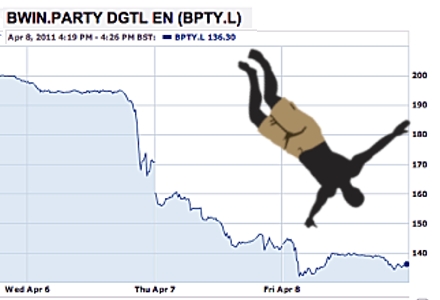Bet365 has increased the distance between itself and #2 ranked Betfair on the Oddschecker top-10. The privately held Stoke outfit increased its market share from 18.9% to 19.5% (a personal best), while publicly traded Betfair slipped from 15.7% to 15.2%. In positional terms, there wasn’t much movement on this latest list, except that Victor Chandler changed places with Stan James, and Skybet did likewise with Boylesports. The full Oddschecker top-10 reads as follows: Bet365 (19.5%); Betfair (15.2%); Paddy Power (9.0%): William Hill (8.5%): Stan James (7.4%); Victor Chandler (7.1%); Coral (5.3%): Boylesports (4.9%); Skybet (4.5%); Betfred (4.1%)
 Meanwhile, it was another bloody day for bwin.party (Pwin) on the killing floor of the London Stock Exchange. Pwin shares have now lost close to a third of their value over the past three days, and analysts at UBS believe the worst is yet to come. UBS’ Simon Whittington issued a ‘sell’ note on Pwindenburg stock, reducing its price target from 185p to a mere 100p. “We believe there could be further weakness in the shares. Whilst we do not expect the punishing regulation to cause all German profits to be lost, the uncertainty means this scenario should now be at least considered. Even if profits are not lost, the risk attached to this is likely to step up significantly, and we see the current risk/reward as highly unattractive … Save for EU intervention, we see little reason for the German Lander to make meaningful concessions.”
Meanwhile, it was another bloody day for bwin.party (Pwin) on the killing floor of the London Stock Exchange. Pwin shares have now lost close to a third of their value over the past three days, and analysts at UBS believe the worst is yet to come. UBS’ Simon Whittington issued a ‘sell’ note on Pwindenburg stock, reducing its price target from 185p to a mere 100p. “We believe there could be further weakness in the shares. Whilst we do not expect the punishing regulation to cause all German profits to be lost, the uncertainty means this scenario should now be at least considered. Even if profits are not lost, the risk attached to this is likely to step up significantly, and we see the current risk/reward as highly unattractive … Save for EU intervention, we see little reason for the German Lander to make meaningful concessions.”
The vulnerability of public gaming companies to the whims of governments extends even to gaming-related firms. Pwin’s pwoblems thoroughly spoiled the market debut of digital sports media outfit Perform, which had already been forced to price its shares at the absolute low end of its stated range. Shares then proceeded to lose 15% of their value on their very first day on offer. Nice. Wonder how Skrill (the online payment outfit formerly known as Moneybookers) will fare next week, when its own IPO is scheduled to go off in London. We emphasize scheduled, because while companies who get the urge to go public may be considered foolish, they aren’t always crazy.
